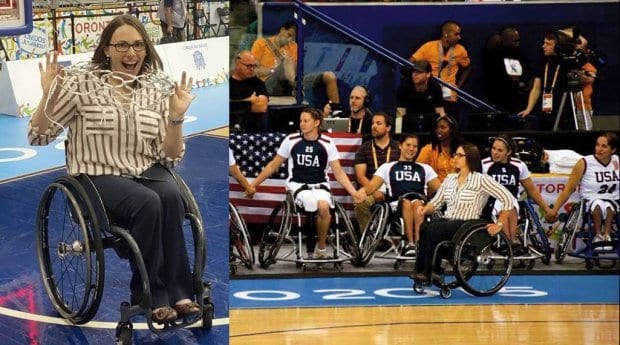If Canada’s loss in the women’s wheelchair basketball final to the United States during these past Parapan Am Games still stings, here’s one bright spot – Stephanie Wheeler, the US coach, is a proud lesbian. This champion coach and former player has long been an advocate of wheelchair basketball, and has more recently joined the call for advancing LGBT inclusiveness in sports.
Having come out while still playing in 2009 and gone on to attend such events as the Nike LGBT Sports Summit in Portland in June 2015, Wheeler is making wheelchair basketball part of the conversation.
“I’m a firm believer that, as an athlete, that you’ve got to put all of yourself into your training,” she says. “There’s just so much that’s required of you as an athlete to be great, and if you’re holding this piece of yourself hostage, or you’re not fully being who you can be, then you’re not going to be as successful as you can be.”
Wheeler’s history with the sport spans over 20 years, including nine years as a player on the United States national team from 2001 to 2010, during which time she won gold at the 2004 and 2008 Paralympics. She’s been the national team’s head coach since January 2013, and she’ll begin her seventh season as head coach of the University of Illinois’ women’s wheelchair basketball team at the end of August. And, somehow, she’s also finding the time to work on getting her PhD in sports sociology.
“I knew I wanted to come back to a place that had so much tradition and history in our sport,” she says of her university. When the head coach position opened up, that’s exactly what happened.
During that first year, three other universities joined the University of Illinois in collegiate play. Prior to this, the school played in a women’s open club division with teams from other cities. Wheeler was part of the group of coaches that helped put bylaws together and push for the expansion.
In 2009 she would again do something significant for her sport – come out. Having herself only realized she was gay in 2008, her decision to come out in the sports world came at the end of her playing career. By then, keeping it from her teammates had become “exhausting.”
There was no formal coming-out talk in the locker room. For Wheeler, it was one-on-one chats with the teammates she felt closest to, and dropping the news casually in conversations with others. “It was just something that I didn’t hide anymore.”
“That was important to me – to be able to give all of who I was to that team.”
Although she was the only out player on her team, she says she felt their support. The competition, however, proved to be another story. “You would know they were saying something,” she says.
Still, it would appear that hasn’t stopped others from following her example. Her national team currently has two out players in its ranks. But she insists there’s a lot more that needs to happen.
“Within our wheelchair basketball environment, it’s not something that is ever really talked about.”
The National Wheelchair Basketball Association (NWBA) governs the national team, intercollegiate divisions and more. Wheeler would like to see a top-down approach where it concerns inclusiveness in the sport. “There’s never really been any reach-out programming or anything like that from the National Wheelchair Basketball Association to be inclusive,” she says.
By having come out publicly and taking part in the LGBT Sports Coalition, she believes she’s brought attention to the fact that there is a gay presence within the NWBA and that the association needs to address that all people are welcome.
Once diversity and inclusion programming are in place, she says the next step would be for coaches to create a welcoming environment for their players. She’s created that safe space for her own teams, having had players come out to her, and it’s arguably been one of the elements that have driven their success.
The United States’ performance in Toronto qualified them for the 2016 Paralympics in Rio de Janeiro, where Wheeler hopes to extend the successful run. “The goal is to get on the podium, but I think ultimately we want to be on top of the podium.”


 Why you can trust Xtra
Why you can trust Xtra


